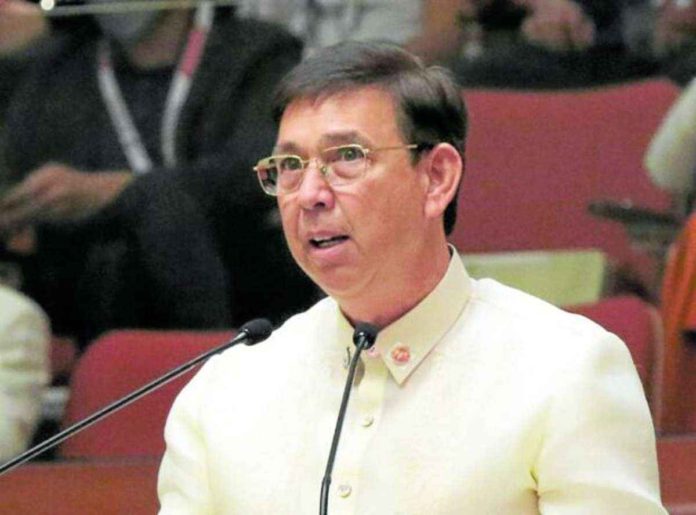
MANILA – Taming high food prices and bringing the government’s fiscal health back to its pre-pandemic shape are the top challenges facing newly appointed Finance Secretary Ralph Recto, according to analysts.
President Ferdinand Marcos Jr. tapped the Batangas congressman and House deputy speaker as the new head of the Department of Finance (DOF), ending months of speculation about the changing of the guard in the Cabinet’s economic cluster.
Recto, 60, replaced Benjamin Diokno, who has served as finance secretary since Marcos took office in June 2022.
‘Numbers genius’
A lawmaker for much of the past three decades, Recto was the director general of the National Economic and Development Authority from 2008 to 2009 under then President Gloria Macapagal-Arroyo.
Senate President Juan Miguel Zubiri was all praises for his former colleague.
Recto, who served as Senate President Pro Tempore in the previous Congress, was the chamber’s “resident numbers genius,” Zubiri said.
“This was not just for his mathematical ability, but more importantly for his ability to immediately see the big picture implications of these numbers,” he said, adding: “More than most, he understands how to bridge the gap between the abstractions of mathematics and the very concrete realities that we face as a nation.”
Minority Leader Aquilino Pimentel Jr. said Recto’s “knowledge of the political and fiscal structures of the country will serve us well in the future.”
Some economic experts said Recto had his work cut out for him.
Eye on food inflation
“While inflation has decelerated, the price level of food commodities remains elevated. El Niño is threatening to cause further food price spikes and reignite inflation,” said Calixto Chikiamco, president of Foundation for Economic Freedom, a policy advocacy group.
“As a member of the economic team, [Recto should] address inflation, particularly food inflation,” he added.
Latest government data showed inflation softened to a 22-month low of 3.9 percent in December last year, the first time since March 2022 that price growth settled within the 2- to 4-percent target range of the Bangko Sentral ng Pilipinas (BSP).
But the BSP still missed its target for the second straight year after inflation averaged 6 percent in 2023.
Meanwhile, rice price inflation accelerated for the second consecutive month in December to 19.6 percent, the fastest since March 2009.
“The public would expect, at first and at most, an immediate reduction in prices or at least lower inflation rates,” Anthony Lawrence Borja, political science professor at De La Salle University in Manila, said.
Faster debt reduction
Leonardo Lanzona, economist at Ateneo de Manila University, said Recto should strive to bring the state’s fiscal health back to prepandemic condition through a faster reduction in debt.
“Improvements in trade and tax revenues beyond the usual indirect taxes should also be considered. In short, we cannot have the business as usual position that previous managers were advocating. Major reforms need to be in place,” Lanzona said.
Under its outgoing chief Diokno, the DOF had wanted Mr. Marcos to press Congress to hasten approval of such bills as Package 4 of the Comprehensive Tax Reform Program; the Value Added Tax (VAT) on Digital Service Providers; Excise Tax on Single-Use Plastic Bags; and Excise Tax on Sweetened Beverages and Junk Food.
The DOF was also pushing for the passage of Package 3 or the Real Property Valuation and Assessment Reform, and the VAT refund for foreign tourists.
For Borja, the upcoming midterm elections may emerge as a big hurdle for tax reforms under Recto, known for being the main proponent of the expanded VAT law back in 2005.
“As for tax reforms, it would be a matter of timing to maximize political capital in both houses of Congress while minimizing negative impacts on public opinion given that the 2025 elections are on the horizon,” he said.Political career, education
A member of the Nacionalista Party, Recto began his political career as representative of Batangas’ fourth district in 1992. He was elected senator in 2001 and served multiple terms until 2022.
At present, he represents the sixth district of Batangas in the House.
Recto finished commerce with a major in business management at De La Salle University in Manila in 1989, and earned a certificate in business economics from the University of Asia and the Pacific in 1993. He also took master’s degree units in public administration at the University of the Philippines and a leadership course at Harvard University’s John F. Kennedy School of Government.
Born in Quezon City, Recto is related to the late nationalist and statesman Claro Mayo Recto, also a former senator.
He is the second child of lawyer Rafael Recto, who served as an assemblyman in the Regular Batasang Pambansa, and Carmen Gonzalez Recto, whose family is from Pangasinan. (Ian Nicolas P. Cigaral, Nestor Corrales, Melvin Gascon, Inquirer Research © Philippine Daily Inquirer, Reuters)



